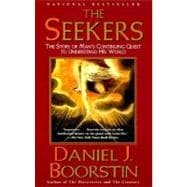
Note: Supplemental materials are not guaranteed with Rental or Used book purchases.
Purchase Benefits
What is included with this book?
| A Personal Note to the Reader | |
| An Ancient Heritage | |
| The Way of Prophets: A Higher Authority | |
| From Seer to Prophet: Moses' Test of Obedience | p. 5 |
| A Covenanting God: Isaiah's Test of Faith | p. 8 |
| Struggles of the Believer: Job | p. 11 |
| A World Self-Explained: Evil in the East | p. 14 |
| The Way of Philosophers: A Wondrous Instrument Within | |
| Socrates' Discovery of Ignorance | p. 21 |
| The Life in the Spoken Word | p. 33 |
| Plato's Other-World of Ideas | p. 37 |
| Paths to Utopia: Virtues Writ Large | p. 43 |
| Aristotle: An Outsider in Athens | p. 47 |
| On Paths of Common Sense | p. 51 |
| Aristotle's God for a Changeful World | p. 57 |
| The Christian Way: Experiments in Community | |
| Fellowship of the Faithful: The Church | p. 63 |
| Islands of Faith: Monasteries | p. 71 |
| The Way of Disputation: Universities | p. 81 |
| Varieties of the Protestant Way: Erasmus, Luther, Calvin | p. 91 |
| Communal Search | |
| Ways of Discovery: In Search of Experience | |
| The Legacy of Homer: Myth and the Heroic Past | p. 107 |
| Herodotus and the Birth of History | p. 111 |
| Thucydides Creates a Political Science | p. 119 |
| From Myth to Literature: Virgil | p. 123 |
| Thomas More's New Paths to Utopia | p. 129 |
| Francis Bacon's Vision of Old Idols and New Dominions | p. 132 |
| From the Soul to the Self: Descartes's Island Within | p. 139 |
| The Liberal Way | |
| Machiavelli's Reach for a Nation | p. 149 |
| John Locke Defines the Limits of Knowledge and of Government | p. 153 |
| Voltaire's Summons to Civilization | p. 160 |
| Rousseau Seeks Escape | p. 167 |
| Jefferson's American Quest | p. 171 |
| Hegel's Turn to "The Divine Idea on Earth" | p. 174 |
| Paths to the Future | |
| The Momentum of History: Ways of Social Science | |
| A Gospel and a Science of Progress: Condorcet to Comte | p. 183 |
| Karl Marx's Pursuit of Destiny | p. 190 |
| From Nations to Cultures: Spengler and Toynbee | p. 194 |
| A World in Revolution? | p. 201 |
| Sanctuaries of Doubt | |
| "All History Is Biography": Carlyle and Emerson | p. 207 |
| Kierkegaard Turns from History to Existence | p. 213 |
| From Truth to Streams of Consciousness with William James | p. 218 |
| The Solace and Wonder of Diversity | p. 221 |
| The Literature of Bewilderment | p. 228 |
| A World in Process: The Meaning in the Seeking | |
| Acton's "Madonna of the Future" | p. 235 |
| Malraux's Charms of Anti-Destiny | p. 240 |
| Rediscovering Time: Bergson's Creative Evolution | p. 245 |
| Defining the Mystery: Einstein's Search for Unity | p. 250 |
| Some Reference Notes | p. 261 |
| Acknowledgments | p. 279 |
| Index | p. 281 |
| Table of Contents provided by Blackwell. All Rights Reserved. |
The New copy of this book will include any supplemental materials advertised. Please check the title of the book to determine if it should include any access cards, study guides, lab manuals, CDs, etc.
The Used, Rental and eBook copies of this book are not guaranteed to include any supplemental materials. Typically, only the book itself is included. This is true even if the title states it includes any access cards, study guides, lab manuals, CDs, etc.
Excerpted from The Seekers: The Story of Man's Continuing Quest to Understand His World by Daniel J. Boorstin
All rights reserved by the original copyright owners. Excerpts are provided for display purposes only and may not be reproduced, reprinted or distributed without the written permission of the publisher.